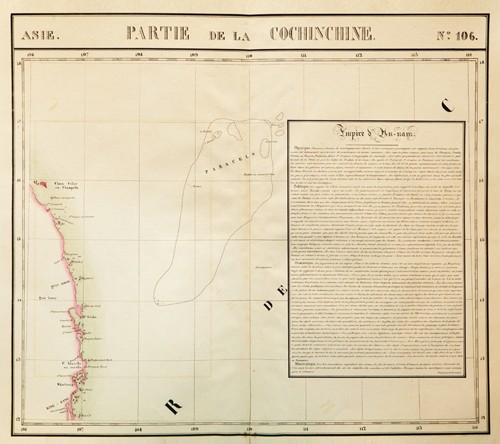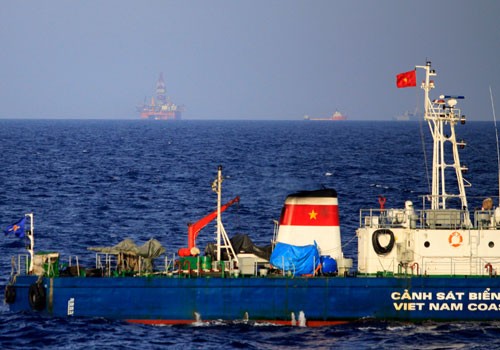(VOVworld) – In the previous edition, we talked about sovereignty over Hoang Sa and Truong Sa under international law, previous territorial disputes and resolutions around the world, and Vietnam’s irrefutable historical and legal evidence of its ownership of the Hoang Sa (Paracel) and Truong Sa (Spratly) archipelagos. China has no basis for claiming sovereignty over these two archipelagos. In this edition, VOV will use international law to analyze China’s arguments and theory of historical sovereignty to defend its viewpoints.
 |
Map named as “Partie de la Cochinchie” shows the State of Annam with Hoang Sa archipelago (photo: vietnam.vn)
|
China bases its claims of sovereignty over Xisha and Nansha, its names for Vietnam’s Hoang Sa and Truong Sa archipelagos, on the principle of historical sovereignty and historical title.
As we stated in our previous broadcast, actual, uninterrupted, and peaceful occupation in the name of a state is the key factor establishing the sovereignty of a coastal country. China can show no convincing evidence of its continuous and peaceful occupation of Hoang Sa and Truong Sa archipelagos.
Ancient Chinese maps do not include Hoang Sa and Truong Sa
The Hoang Sa and Truong Sa archipelagos were not included in any ancient maps produced by China or by western countries. Ancient documents in Chinese do not mention China exercising its sovereignty over foreign merchant or fishing boats in Hoang Sa or Truong Sa.
The legal operation of Vietnam’s Hoang Sa fleet and the Northern Marine Force of the Nguyen dynasty was acknowledged by the Chinese feudal regimes. In 1753, the Hoang Sa fleet was struck by a storm and sought shelter in Qiong Zhou of the Qing dynasty. The ruler of Qiong Zhou resupplied them and sent them home. That means the Chinese feudal regime did not oppose the activities of the Hoang Sa fleet and even supported them.
Chinese historical documents do not mention Chinaese sovereignty over the two archipelagos. The book “Marine and Ground”, by Wang Pingnan (1820-1842) wrote “Thousand miles of Truong Sa (which is now Hoang Sa) is a long sand ridge which is the outer protection of An Nam (now Vietnam).”
In “An Overseas Chronicle” of Chinese Monk Shang Dashan in 1696, the author describes the Hoang Sa fleet as representing Vietnam’s sovereignty.

Vietnam coast guard ships perform duties in Hoang Sa archipelago. From afar, China illegally places its oil rig Haiyang 981 on Vietnam's EEZ. and continental shelf |
Making up historical evidence to rationalize sovereignty
Lacking historical facts, China says it has historical sovereignty and title because Chinese people discovered and came to Hoang Sa and Truong Sa to do business thousands of years ago. China ignores the basic principle that sovereignty depends on a state status. Exploitation without occupation or intention to affirm sovereignty in the name of a state, is not sufficient to have ownership of a place recognized internationally.
Furthermore, announcing historical sovereignty over Hoang Sa and some islands of Truong Sa, which China invaded and occupied in 1974 and 1988, goes against the principle of peace contained in the 1982 UN Convention on the Law of the Sea.
China is citing vague historical evidence to prove its sovereignty, but international has clear criteria for resolving territorial disputes.
The theory of historical sovereignty under international law
Experts in international law say China’s claim of sovereignty has no legal basis. China’s claims are unsupported by documents. Erik Franckx, law Professor at Vrije University Brussels, says the map China sent to the UN in 2009 showing a U-shaped line encircling Vietnam’s Hoang Sa and Truong Sa archipelagos, lacks technical precision and has no legal basis. To reinforce its groundless sovereignty claim, China has denied historical evidence, violated the rights of East Sea coastal countries on their continental shelf, and ignored its obligations under the 1982 UNCLOS.
China’s perverse behavior in the East Sea is fooling no one.